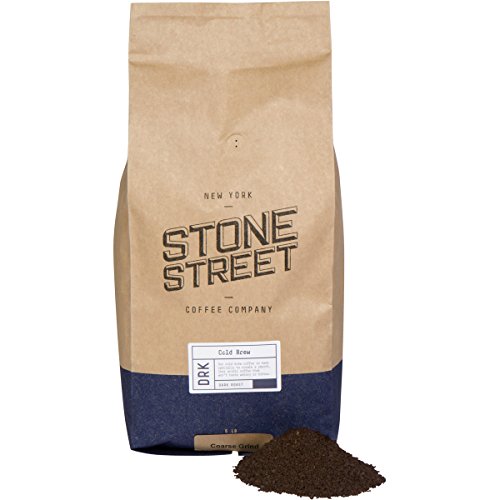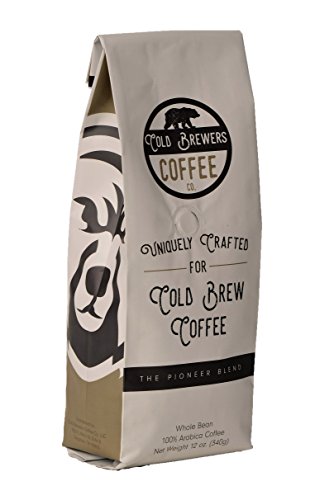Top 10 Coffee Brands for Cold Brewing – 2025 Review and Buyer’s Guide
Cold brew is a completely different take on how to brew coffee. All other methods use the extractive power of hot water to absorb the flavors of coffee and make them into the final cup. Cold water is used instead for cold brewing.
Whereas it has a lower extractive power, cold water can extract many of the coffee flavors as well as hot water, given enough time. Cold brews can take anywhere from a couple of hours to more than a full day.
During this long time, cold water absorbs many of the oils and solid components of coffee but less of the bitterness and acidity of it. Cold brews are generally smoother, gentler and milder than the hot methods. That means that coffee beans of a particular type shine with cold brews: those who aren’t very dark roasted, nor with a heavy body or of high intensity. These aspects would be lost with a cold brew.
Instead, some of the best coffee for cold brew are sweet, mellow and richly flavorful. Specific coffee beans for cold brew have been selected by producers, and we have chosen only the very best ones for cold brewing.
Tiny Footprint Coffee Organic Cold Press Elixir

An “earth positive” approach to coffee sourcing, Tiny Footprint Coffee plants trees in the Ecuadorian forest to offset the pollution that inevitably comes from coffee’s production. Elixir is their blend that is specifically for cold brews. A mix of dark and light roasted beans, for a sweet, silky and full of aroma coffee.
Café Du Monde Coffee with Chicory

Operating from New Orleans since 1862, the particularity of their blend for cold brewing is that chicory is added. Used since centuries as a coffee substitute, chicory donates a smoky yet mellow flavor to the coffee, keeping low the bitterness and exalted by the long, cold brewing method.
Cold Buzz Coffee Hazelnut

For an easier cold brewing, Cold Buzz Coffee sells their coffee pre-ground in bags similar to tea’s. It’s only necessary to soak them in cold water and let the brew work its magic. Their hazelnut-flavored blend is one of the best coffee for cold brew, with the nuttiness of the nuts balancing the darker roast of the coffee.
Farmer’s Market Jo, Light Medium Roast

Certified USDA organic coffee, Farmer’s Market Jo uses a blend of Arabica coffee that is also Fair Trade and Kosher certified. Their light-medium roast is ideal for cold brew, with a natural sweetness and hints of chocolate to create a rich coffee experience.
Real Good Coffee Company Breakfast Blend

Using only Arabica, light roasted, from Central and South America, Real Good Coffee’s Breakfast blend is light and balanced. Tones of fruits and cream shine through in a cold brew, making it a great, light, refreshing drink for the summer days.
Stone Street Cold Brew

100% Arabica from Colombian Supremo beans, Stone Street Cold Brew is a long-time favorite of many cold brews enthusiasts. It’s a classic, darkly roasted single origin, that comes both in pre-ground and whole beans. For those looking for a guaranteed, among the best coffee for cold brew in the world, Stone Street Cold Brew is a sure choice.
Bizzy Best Organic Coffee For Cold Brew

With a grind size optimized for cold brewing, quite coarse, Bizzy Best Organic Coffee is organic, as per the name, and a great basis for your cold brews. 100% Arabica beans from Nicaragua and Peru, this blend merges both light, medium and dark roasted beans for a truly balanced flavor.
The Chosen Bean Cold Brew Coffee
100% Arabica beans for this blend coming from multiple origins: Sumatra, Ethiopia, Mexico and Guatemala are all selected to provide the best possible cold brew. Surely one of the best coffee for cold brew. The resulting taste is a mix of chocolate, nuts, coconut and quite sweet.
Pioneer Blend Best Quality Coffee For Cold Brew

5 different beans make this blend for cold brew. All are differently roasted, to create a unique blend of flavors. Pioneer Blend is a great choice for cold brew, with a strong aroma, a pleasant aftertaste and generally apt to be brewed as hot coffee too. Versatile and good!
Faro House Best Taste Coffee For Cold Brew

Specifically roasted to reduce acidity, Faro House Best Taste coffee is a great cold brew blend. Those looking for a rich aroma, low acidity and a 100% Arabica coffee can look no further than this blend. A long aftertaste for a carefully selected range of coffee beans, perfect as a cold, summer drink.
Cold Brew Coffee Flavor
When speaking about cold brew, most ask…
What’s the difference with hot coffee?
The different temperature of the water means that different components are extracted, creating a similar but different brew compared to any other hot brewing methods. Many of the acids and solubles responsible for light and floral notes in coffee aren’t extracted with a cold brew.
That is the main reason cold brews are low in acidity and very easy on the stomach. The oils contained in the coffee beans are extracted, though, for a silky, smooth, light on the taste buds coffee experience.
Brewing Methods
Cold brews aren’t all the same. 2 methods of extracting coffee with cold water are the most common: immersion and cold drip.
Immersion is the most straightforward one; it entails immersing the ground coffee, usually quite coarse, in the water and letting it rest for quite a long time (between 12 and 24 hours). Then the liquid is filtered and ready to drink.
Cold drip is like a hot drip: cold water is slowly dripped onto ground coffee and collected in a large container. This method is quicker but still needs 3-5 hours to complete. The main difference is that cold drip creates a lighter bodied coffee, while immersion a fuller cup of coffee.
Check out our Review of Cold Brewers for more information!
Benefits of Cold Brew Coffee
Whichever method you choose, the benefits of cold brew over hot coffee are 2 main things. Less acidity and a milder taste.
The more acid components of coffee are extracted only through hot water and are thus lost with a cold brew. That is excellent for those whose stomach is easily upset by the acidity of some foods, coffee included.
The cold brew method doesn’t also collect some of the stronger flavors of some coffee, like tobacco, caramel and dark chocolate, and neither the lightest ones, like florals. It is a quite “in the middle” method to brew a balanced, medium-bodied and never too strong cup of coffee.
By choosing one of the best coffee for cold brew we listed before you can be sure to have the right beans for a great cold brew.
Single Origin vs Blends
It is noticeable how some of those coffee brands are blends and others are single origins. The latter means that all the beans come from the same growing region, sometimes the very same farm.
While blends are selected by experts to have a specific taste profile. For beginners of cold brews, a single origin may be the best choice as they provide a reliable and accurate taste, less subject to human’s selection. Once you have developed your taste for what you like in a cold brew, a specific blend that aims to reproduce it will be the right choice.
Does Grind Size Matter?
Once you have your beans, it is important to grind them to the right size for cold brewing. A coarse size is usually preferred. If the beans are ground fine, the extraction will be accelerated and lead to over-extraction resulting in a more bitter coffee.
A coarse ground coffee is instead ideal for cold brews. It will allow coffee to be extracted more slowly and gently, without risks of extracting undesirable flavors. You may choose any of the pre-ground coffee we listed earlier as they’ve been specifically ground with a cold brew in mind.
Learn more about what grinds sizes match what brewing methods in our guide to coffee bean grinding size!
Does Roast Matter
Accordingly, the roasting type of the reviewed coffee brands has been accurately selected to work well with a cold brewing method. If you’re shopping by yourself, tend to look for roasts that are either medium or medium/light, as they express the best of themselves in a cold brew.
Darker roasts tend to have more bitterness and body. Two elements that, while not bad per se, aren’t exalted by the cold brewing. Very light roasts can be too light for a cold brew and turn up watery.
Go for the middle roasts and avoid the extremes until you have experimented with cold brewing for a while.
What to Add?
After many hours once you have your cold brew coffee, it is time to customize it! Many coffee aficionados won’t add anything to it, but a splash of cream or little amounts of milk tend to exalt the sweeter, mellower aspects of the cold brew. Not too much as to overpower the coffee but just enough to complement it will be a great choice.
Obviously, cold brew lends itself to be a superb summer drink. Lots of ice is usually added to keep it cool, but it can lead to diluting the brew, losing part of its attractiveness. Balled ice is best as they melt slower than the classic ice cubes. Add enough ice to keep it fresh for as long as you plan it to drink, but nothing more, so not to spoil the coffee.
Some like to add a splash of alcohol to their cold brew coffee. If you like it go on. Just make sure the choice of alcohol isn’t in contrast with the taste profile of your coffee, nor too much as to overwhelm it. Lighter spirits or liqueurs are recommended with a cold brew.
Tips for Cold Brewing
Cold brew coffee is more delicate than hot coffee and a greater care should be taken to make sure the taste doesn’t go too much on the stronger nor the lighter side. Thus, some tips on how to brew cold are necessary to keep in mind:
- Don’t steep darker roasts for the same time as lighter ones. The cold brew will end up quite bitter and unpleasant.
- If you have them, use cold stones to chill the cold brew, as they won’t add any water to it and won’t dilute the taste.
- Choose the immersion or cold drip method according to your specific taste. For a fuller body, go with immersion; for a lighter cup of coffee, go with cold drip.
- Don’t use any “espresso blend” or similar for cold brews. The espressos are a completely different drink and need different characteristics in their beans. They won’t work well with a cold brew.
- Go instead with either one of the best coffee for cold brew in our list or a coarse grind. They will guarantee an adequate extraction.
- In the end, choose the coffee profile you like the most that is meant for a cold brew and start experimenting with the methods and time of brewing to obtain your perfect cold brew coffee!